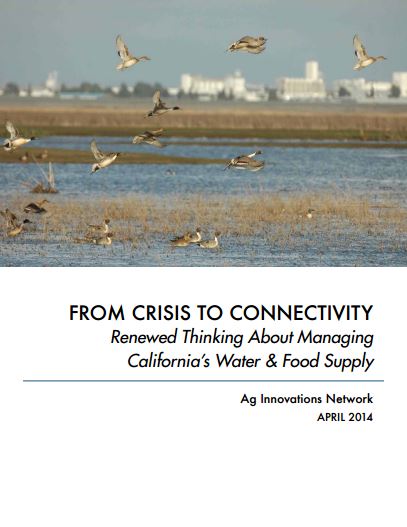Renewed Thinking About Managing California’s Water & Food Supply
From Crisis to Connectivity: Renewed Thinking About Managing California’s Water and Food Supply
Click Here to Download PDF
Summary
April 2014
The WATER Institute contributes to the following new report.
Water crises in California are not new. In recent times, however, record drought, groundwater contamination and overdraft, environmental impacts, aging infrastructure, a growing population, competing water needs, and climate change have further elevated the sense of urgency in addressing California’s water quality, supply reliability, and food production.
In an attempt to uncover the root causes of these challenges and identify a new, strategic approach to addressing them, the California Roundtable on Water and Food Supply (CRWFS) has published a new report, From Crisis to Connectivity: Renewed Thinking About Managing California’s Water and Food Supply. The report describes the connectivity approach, providing a whole-systems framework for our water management decisions, including guiding principles for:
- Connected thinking
- Institutional linkages
- Public and stakeholder engagement
Accompanying the report is a booklet featuring existing efforts that already apply these guiding principles and generate the sorts of connected-benefit solutions described in the report: Applying the Connectivity Approach: Water and Food Supply Projects in California that Connect, Link, and Engage. CRWFS invites you to take similar action toward applying the connectivity principles to your own water management efforts and helping to increase shared ownership of these issues in the public domain.
More information about this work, as well as CRWFS’s previous reports on agricultural water stewardship and retention of water in the landscape, can be found at http://aginnovations.org/roundtables/crwfs/.






